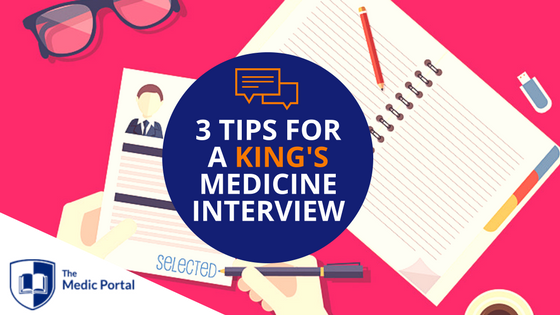
Looking for top tips for a King’s medicine interview? You’ve come to the right place!
Interview format: MMI
Applying to Medicine for 2018 entry? Book a space on our newly announced MMI Circuits!
Book an MMI CircuitWe’re guessing you’ve bagged yourself a King’s interview if you’re reading this, so firstly congratulations and a big pat on the back! The end of the road is not far now, but before that, preparing for your interview is key.
The King’s interview is in the Multiple Mini Interview (MMI) format with a circuit of timed stations assessing various qualities and skills. The stations can cover a range of topics including personality attributes, information handling, topical issues, and medical ethics. Here are some top tips for a King’s medicine interview.
1. Practise common interview questions
Be able to articulate your motivations to study medicine. For extracurriculars, keep in mind the key skills you gained from them, and see if they’re something you can continue at King’s and thus contribute to the student community.
Appreciate the qualities that make a good doctor – for example, good communication, team-working and dedication amongst others, and be able to suggest how you have demonstrated such qualities in your past experiences with extracurriculars, at school, or in the community.
2. Practice analysing ethical dilemmas
King’s usually has a station on assessing your ability to deal with an ethical dilemma. Ethics may seem like a scary and unfamiliar topic, but with a bit of reading you’ll realise it’s actually quite interesting and structurally straightforward.
Break down the ethical dilemma into the four core principles of medical ethics: autonomy, non-maleficence, beneficence and justice (you can find out more about each of these on our Medical Ethics page).
The UK Clinical Ethics Network website and the book ‘A Very Short Introduction to Medical Ethics’ are useful resources to build an understanding of these principles and how they are applied. I found the General Medical Council’s ‘Good Medical Practice in Action’ scenarios especially useful to understand how these principles are applied in a clinical setting and how they may contradict, and the interactive questions put you on the spot which helps cement the learning.
3. A few more random but very important tips
‘Read around the subject’ is an overused but key phrase: know of and understand key world & NHS medical issues currently in the news. The BBC Health page is a good place to start for topics, as is the New Scientist. I would recommend choosing a couple of issues/topics that interest you and that you’d be happy to discuss, and doing some deeper reading around them to further your understanding of the topic.
Your communication is being assessed throughout each station, so although preparation is key, try not to sound rehearsed in your answers. Your interview is an opportunity to have a conversation about something you are passionate about rather than an exam, so relax and be confident.
Do not worry if you feel you messed up a station, it probably went better than you thought. The beauty of the MMI format is that the interviewer at one station has no idea of your previous performance, so take each station as a fresh start.
Lastly, it can be a tiring day, so get enough sleep and have a good breakfast. And remember, you deserve to be there so believe it!
Words: Aditi Nijwahan
